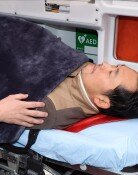Why the Abundance of Pro-Roh Candidates?
Why the Abundance of Pro-Roh Candidates?
Posted July. 02, 2007 03:02,
Rhyu Si-min indicated on the last day of June that he may run for the presidency this year. As a former ruling party representative and minister of the incumbent administration, I may run in the presidential election if it is regarded as conducive to the party, politics, and the nation, said the sleeping dragon of the pro-Roh camp in a posting on his homepage. This is not an appropriate time to make the final decision on my candidateship. I will take time to ponder upon the matter, he added.
There are rumors that Lee Byeong-wan, a former chief-of-staff for Roh, is interested in a presidential candidacy as well. More than one representative of the pan-ruling force recently said that Lee met with some religious leaders to declare his candidacy and ask for their help. An official of the organization he is leading said, however, that he has never heard of Lees candidacy and it has never been discussed within the organization.
As pro-Roh forces are joining the candidate lists of the non-Grand National Party forces, many are conjecturing why they are belatedly showing intense interest in the presidential election. As of July 1, as many as seven figures have announced, or at least said they would announce, their candidacy for the next presidential election, including former prime minister Han Myeong-sook.
The most plausible explanation is that the candidates are more interested in next years general election, and that declaring their candidacy is a strategy to maintain the influence of the pro-Roh camp during the general election, or to pave the way for a seat in the National Assembly.
After the Democratic Party and the Tonghap Party merged, it is difficult to expect that the non-GNP forces will all be integrated to produce a single presidential candidate. At this point, they may have decided that increasing the number of pro-Roh candidates is a good way to maintain their influence until next years general election, said a consultant for politicians.
A National Assembly member who defected from the ruling Uri Party also implied that the candidacy of Lee Hae-chan, former prime minister and currently the most popular of all pro-Roh candidates, is explainable by the same theory. Lee repeatedly said that he had no intention to run for president by April. His belated decision for the presidential candidacy is due to some pro-Roh lawmakers asking him to bear the burden of it because they were worried about losing their influence.
Other explanations for the abundance of pro-Roh candidates include the lack of a strong candidate, and the fact that Roh has yet to announce his preference for a particular candidate.
Not just the pro-Roh forces, but all non-GNP parties are flooded with candidates because they have no strong candidates like Lee Myung-bak and Park Geun-hye of the GNP, said a politics professor at Kyunghee University. The president wont be able to make his intentions known until the field has been narrowed down.
By the same token, former minister Kim Du-kwan and representative Kim Hyuk-kyu recently made verbal attacks against former minister Lee, the leading pro-Roh candidate, in an attempt to curb his rise.
surono@donga.com







